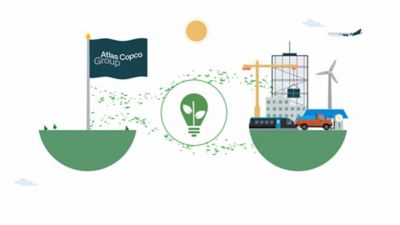Audit, financial and sustainability reporting
Financial statements are prepared in accordance with law and International Financial Reporting Standards (IFRS).
Auditors
The task of the external auditor is to examine Atlas Copco Group’s consolidated accounts and annual report, as well as to review the Board and the CEO’s management of the Company. At the AGM 2023 the audit firm Ernst & Young AB, Sweden, was elected external auditor up to and including the AGM 2024 in compliance with a proposal from the Nomination Committee. The principal auditor is Erik Sandström, Authorized Public Accountant at Ernst & Young AB. At the AGM 2023, Erik Sandström referred to the auditor’s report for the Company and the Group in the annual report and explained the process applied when performing the audit. He also recommended adoption of the presented income statements and balance sheets, discharge of liability for the President and CEO and the Board of Directors, and adoption of the proposed distribution of profits.
Internal controls over financial and sustainability reporting
This section includes a description of Atlas Copco Group’s system of internal controls over financial reporting in accordance with the requirements set forth in the Swedish Code of Corporate Governance and as stipulated by the Swedish Companies Act.
The purpose of well-developed internal controls over financial and sustainability reporting is to ensure correct and reliable financial statements and disclosures.
The basis for the internal control is defined by the overall control environment. The Board of Directors is responsible for establishing an efficient system for internal control and governs the work through the Audit Committee and CEO. Group Management sets the tone for the organization, influencing the control consciousness of employees. One key success factor for a strong control environment lies in ensuring that the organizational structure, decision hierarchy, corporate values in terms of ethics and integrity as well as authority to act, are clearly defined and communicated through guiding documents such as internal policies, guidelines, manuals, and codes.
The financial and sustainability reporting accounting policies and guidelines are issued by Group Management to all subsidiaries, which are followed up with newsletters and conference calls. Trainings are also held for complex accounting areas and new accounting policies. The policies and guidelines detail the appropriate accounting for key risk areas such as revenues, trade receivables, including bad debt provisions, inventory costing and obsolescence, accounting for income taxes (current and deferred), financial instruments and business acquisitions.
The internal control process is based on a control framework that creates structure for the other four components of the process – risk assessment, control activities, information and communication as well as monitoring. The starting point of the process is the framework for internal control issued by the Committee of Sponsoring Organizations of the Treadway Commission (COSO), www.coso.org.
Read more about these processes in the Atlas Copco Annual Report under Corporate Governance.




